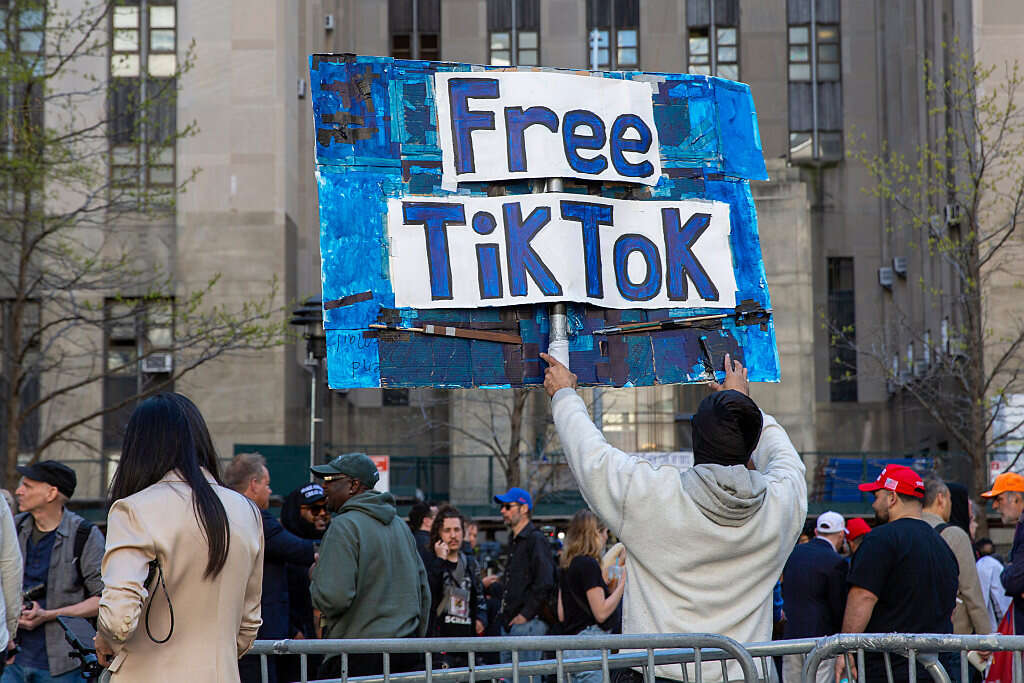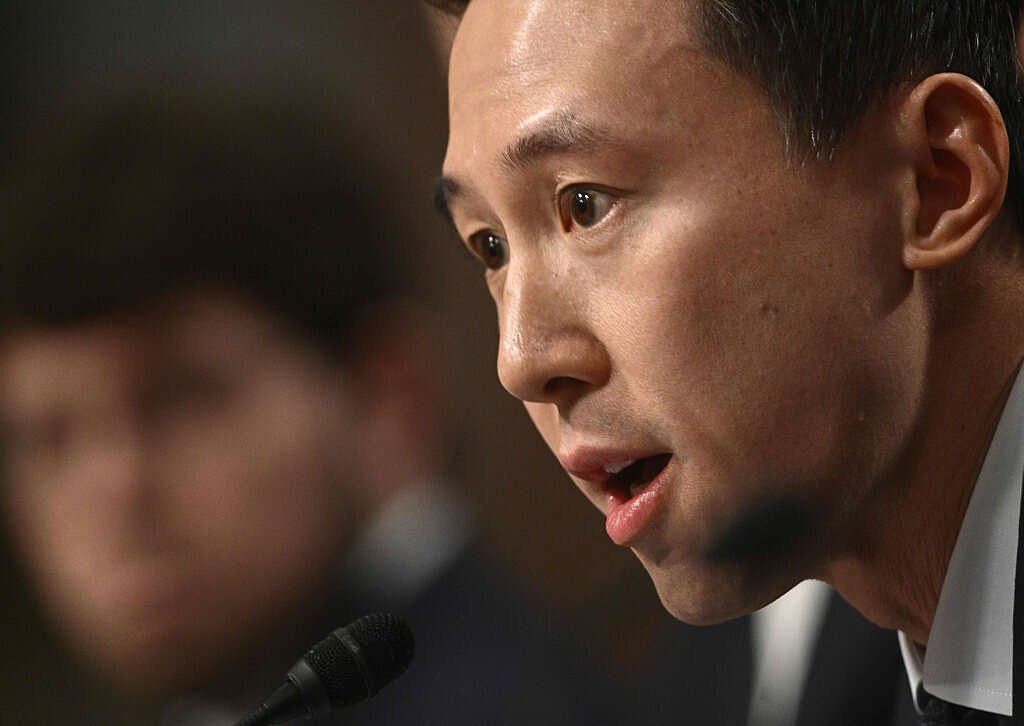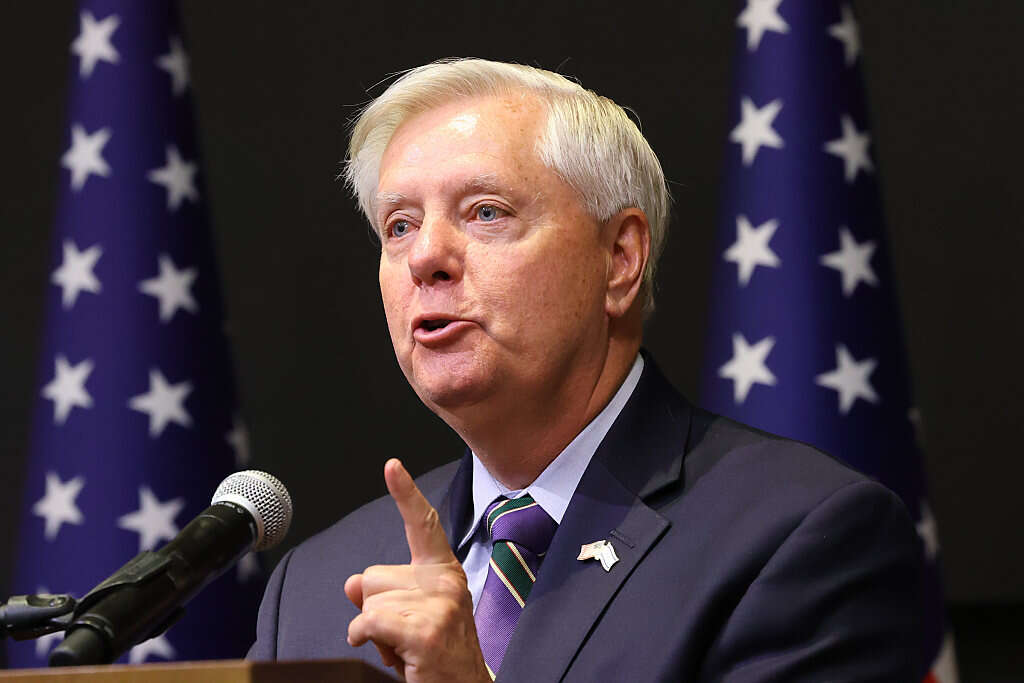For Barak Herscowitz, working at TikTok was a personal and professional dream come true, but after being exposed to the blatant anti-Israel bias of the Chinese social network, he left with a resounding door slam. Against the backdrop of legislation seeking to ban the app in the US, he now reveals how the company's senior executives tried to silence his complaints, and what really happens in the employees' internal groups.
At the end of January, Herscowitz posted a short and pointed message on X, the former Twitter: "I quit TikTok. We live in a time when our very existence as Jews and Israelis is under attack and in danger. In such an unstable era, people's priorities become sharper. Am Yisrael Chai (the nation of Israel lives)."
This text caused quite a drama in the world of social media. The ripple effects quickly reached major American media outlets and even Congress. Herscowitz portrayed TikTok as a company blatantly biased against Israel, sparking a broad public campaign against it. Its current peak is an American law stipulating that the Chinese company ByteDance, linked to the Communist Party in China, must divest from controlling TikTok's operations; otherwise, the app will be banned across the United States.
Herscowitz, 38, resides in Tel Aviv. We met in Sarona, near TikTok Israel's offices, where he recently spent among the best two years of his life, according to his testimony. He was born in Haifa to a family he describes as "right-light," and after the army, he spent a few years in the United States studying at New York University (NYU). "I received a generous scholarship from a wealthy Jewish donor who wanted to connect Israelis and Palestinians," he recounts. "We lived at a level that's hard to describe – we ate at Michelin-starred restaurants, went on ski vacations, all in exchange for two meetings a week with Palestinians, once for discussions about the conflict and once just to have fun."
Upon returning to Israel, Herscowitz began political activity in Likud. "In 2010, I established a body in the party called the 'Manof Forum.' The idea was to build new, young, liberal leadership on the right." He later accompanied the campaigns of Gideon Sa'ar, Yuli Edelstein, Nir Barkat, and others, and opened a strategic and media consulting business. Ahead of the 2021 elections, he was involved in the Yamina party's campaign, and when Naftali Bennett became prime minister, Herscowitz was appointed to a senior position in COVID-19 public relations.
During that period, Herscowitz already knew he wanted to work at TikTok. "I marked this company as my next workplace, even though I had no connections and had never worked in high-tech. It was far-fetched and unlikely, but I wanted to work for the fastest-growing social network in the world. Also, I myself was addicted to the app."
Ultimately, he approached TikTok Israel's management and sold them an idea: "I told them that on Facebook and YouTube, there are people working with the government, but TikTok didn't have that. I explained that it had a double value. First of all, it's good for business because you can bring in government campaigns, but more than that – TikTok was then considered a stupid platform for kids dancing and cat videos. It wasn't on the radar of major advertisers. I told them that if we brought in the government, then banks and insurance companies with deep pockets would follow."
This is how Herscowitz began working as the government affairs manager at TikTok. Part of his job there was to get government ministries and public bodies to open their own channels on the app. "I had two amazing years there, and the experience after October 7 shouldn't and can't overshadow that. We brought in public bodies, did social projects, and raised the prestige and credibility of the platform. Suddenly, TikTok became something much more serious. True, we also rode a wave because TikTok was growing around the world at that time, but not every country saw the same growth as here."
Q: Surely you knew in advance that this is a Chinese-owned company and that its algorithm is highly intrusive and problematic in terms of discourse engineering.
"I was aware of the talk surrounding TikTok, mainly on privacy issues. It was always in the air, but no more than that. Day-to-day, it wasn't interesting enough, and let's remember that there's a lot of criticism and congressional hearings about the other social networks, too. As for the Chinese ownership, I thought there was a hint of racism at the time, and that there was no room for such concern."

Blocking Israeli Creators
During Operation Guardian of the Walls in May 2021, accusations began surfacing that TikTok was contributing to inflaming tensions among Arab Israelis. A new term entered the discourse – "The TikTok Intifada." According to Herscowitz, "Following what happened during those days, TikTok and I worked with the state and made a great deal of effort to remove the security threats that were on the app. The steps taken alleviated my concerns as an employee and the state's concerns."
Q: And then we get to October 7th.
"Everyone talks about waking up to the sound of sirens, I woke up to the sound of my dog barking, hearing the sirens. We quickly understood what was happening. As TikTok employees, we started receiving reports, including from the government, that there was a lot of violent content on the platform, like Hamas live videos showing the horrors from the Gaza periphery area. Despite the Sabbath and the holiday, the relevant employees quickly gathered the information, rang all the bells in Europe and the US, and handled the situation swiftly and aggressively. The problematic videos were removed, and I was very proud of the company I worked for."
This pride dissipated fairly quickly. "Already in the first days of the war, all of the Israeli government's campaigns on TikTok were blocked They claimed that the slogan 'Together we will win' accompanying them was a political statement, as were the Israeli flags appearing in them. These were the explanations I received from TikTok management in Europe. They explained to us that the company was not willing to get involved in conflicts, even in advertisements, regardless of which region in the world or which side. I conveyed this to the government, and overall, the explanation sounded logical to me."
"Afterwards, campaigns by the Hostage and Missing Families Forum were disqualified. These were very soft campaigns, without horrific images, just a call to return them. Again, we were told that nothing political could be published. My unwritten agreement with the company was that I would convey its policy, and it would act fairly and apply that policy to everyone. But suddenly I saw counter-campaigns on TikTok by Palestinians, funded with a lot of money, that definitely related to the conflict. They went up on the network with no problem. This already seemed strange to me. How could it be that what is permitted for Palestinians is forbidden for Israelis?"
"I raised the question to management in Europe, and the responses we received were evasive. For example, they said the Palestinian campaigns were humanitarian. Meanwhile, a campaign by Taglit calling people to volunteer in agriculture in Israel was also disqualified. The reason for the disqualification: On one of the t-shirts, it said 'Am Yisrael Chai' (the nation of Israel lives), and on the site the advertisement was linked to, it said 'We stand with the people of Israel at this time.' From management's perspective, this was a political statement that justified removing the entire campaign. Palestinian campaigns, as mentioned, kept running all the time. I submitted inquiries again and again and did not receive an answer."
Even in the organic content sphere of TikTok users, Herscowitz encountered a similar phenomenon. "We received hundreds and thousands of messages from Israeli content creators who were blocked, or whose videos were restricted to be viewed only in Israel. The Israeli stance was silenced. By the way, to this day, most Israeli content creators are blocked from going live on TikTok. The American user on the app hardly sees any Israeli content, but they definitely see anti-Israeli content."
"The Wall Street Journal conducted an experiment: It opened fictitious accounts of 13-year-old children, and within a few hours, they began to be inundated with anti-Israeli content. A New York Times investigation revealed that certain topics are silenced on TikTok, including pro-Israeli messages. At the same time, reports began arriving from colleagues about a hostile atmosphere toward Jews at TikTok offices around the world and about antisemitic remarks that were not being addressed. I did my best; I warned the company and challenged decisions, but saw that I was not succeeding."

Q: Did you consult with Anna Pelkin, CEO of TikTok Israel?
"The employees at TikTok Israel are trying to do everything they can. They are fighting and paying the price. Sometimes, they are seen as a nuisance and people make faces at them, and yet they do their best – not necessarily from the pro-Israel position, but to clean the platform of antisemitic content. Sometimes, they succeed. There are employees who have made this a personal mission that they work on after regular work hours."
"I don't want to judge other employees, everyone has their own considerations, but something was burning inside me which is why I did what I did," he says about his resignation. "By the way, this also unfolded differently than I had planned. I was much more fearful, I didn't think about how things would eventually play out."
Q: Who else saw this?
In the early stages, Herscowitz believed it was still possible to resolve the issue through dialogue with TikTok's management. "Someone told me that there are groups on the company's internal network whose purpose is to support the Palestinians. Unlike other workplaces, it's not common at TikTok to set up non-professional groups. There are some, but not many. For example, there is a Jewish group, where they mostly share kneidelach recipes. Since October 7, some members have talked about how difficult it is for them at the workplace."
"I entered one of the Palestinian groups and discovered that they were using it to promote BDS messages and very extreme views against Israel. During the prisoner exchange deal, I saw this group celebrating the release of the Palestinian female terrorists. I decided to raise the issue with the company's management, mainly because almost all the employees in this group belonged to departments that are supposed to enforce TikTok's policy, meaning decide what goes up and what doesn't on the app. These are the teams that need to be the most non-political, fair, and objective. I collected everything I found, prepared a long professional document, and sent it to TikTok's highest global management in America and Singapore. This happened in early December. About twenty very senior people were addressed in this email, and all the managers above me."
Q: And what happened?
"You would expect the company to handle this, but that's not what happened. The first responses I received were along the lines of 'Who else saw this,' 'Who else did you send it to.' There was a great concern about who the report would reach and much less interest in the content. From that moment on, I felt a sense of pressure and hostility towards me. It started with nuances, but the climax was when a very senior TikTok executive, a Jew from the United States, approached me and said he wanted to discuss what I had sent. He explained that he understands the situation, sees the antisemitic wave in the world, feels it, and wants to think together about how we solve the issue within the company. I was very happy, as this is what I wanted to happen."
"The Zoom conversation was nice, but as it went on, I felt like I was under investigation. He started asking me who I had consulted with and who I had shown the document to before sending it. I also felt he was trying to implicate other people in the company who may have leaked the document. I was very disappointed, but I still believed in the system. Every few days I would send an email to the company asking what was happening. I didn't receive serious answers, and at one point, an executive at the company told me: 'It's possible we won't be able to tell you what steps we're taking to address what you wrote.' What kind of response is that? I didn't ask to know who was fired, but to ensure that steps were being taken to solve the problem."
Q: When did your breaking point arrive?
"When parts of the document were published on Fox News. At this stage, I still planned to work at TikTok in the coming years, but then I saw the company's response: 'These are lies.' I understood that an organization that wants to take responsibility and fix things does not respond like that. You can't say 'It's all lies' and then fix it, those don't go together. That's when the decision to leave solidified for me, and I resigned in mid-January. Let's just say there was no attempt to persuade me to stay."
Q: You gave up on a professional dream that had been realized.
"The feeling after the resignation was intense. For the first time in my life, I contemplated what it means to be a free person and to take action related to that. It was very meaningful to me. The world is drowning in a swamp of lies, and I felt pride in knowing that the lie may be winning now, but not through me."
"I wrote a short tweet, and it exploded in Israel and around the world. Afterward, there was a hearing in the US Senate for all social networks, which wasn't even related to Israel, but the part dealing with TikTok extensively covered my resignation and the antisemitic content on the network. Some of it came from the report I sent and some from other publications. The law against TikTok was already brewing in Congress, and senior Congressman Lindsey Graham grilled TikTok's CEO in that hearing, who tried to evade and did not really answer the questions."

Exposing the Data
Herscowitz does not think it matters whether the anti-Israel bias on TikTok comes from above or from the "zeitgeist" among the employees responsible for censorship. "I did not see interference from the Chinese government in the app, and I'm also not familiar with the algorithm because it wasn't part of my job," he says. "There are studies that have shown that topics that are inconvenient for the Chinese government receive different treatment on the platform compared to other topics. The most amazing thing to me in this story is that the moment after the exposure, TikTok blocked access to the data that enabled these studies. Suppose it wasn't an intentional policy, but rather many antisemites happened to reach positions that enabled it. Even then, once the problem surfaced and the whole world is talking about it and TikTok still isn't addressing it – it already becomes a policy. These decisions are not made at a junior level but in consultation with TikTok's CEO and the highest senior management."
Q: How is TikTok different, for example, from Twitter? That network also has a lot of antisemitic content that receives wide exposure.
"First of all, these things really need to be fought on other networks as well. This is not a battle of Jews or Israel; the primary victims are the American and European audiences, the users. They are sure that these networks provide them with an accurate picture of opinions in the world, but if you receive a stream engineered to be false and misleading, you are the victim. And yet, Twitter is different because it declares that there will be as little regulation as possible there and everyone can do almost anything they want, and this policy applies equally to everyone. On TikTok, there is content censorship. In principle, this could be fine, but when the censorship is so biased and one-sided, that's the problem."
Q: So what do we do?
"I'm about to embark on a series of lectures to Jewish and Christian communities in America to wake them up. The Western, democratic world is engaged in a war it doesn't know it's a part of, a war over consciousness. I hope we win in Gaza with the help of planes and tanks, but Hamas is also waging another war against us, aimed at eroding us, eroding support for us, weakening us legally, publicly, and consciously, and turning us into a leper state. These things are happening primarily on social networks because that's where young people in the West consume information and news today."
"The free and democratic West must understand that it is dealing with something very big. We need to rethink the question of who can post on these networks. Perhaps it is not right for every anonymous person to be able to post any content they want, perhaps an authentication model is needed. It won't solve all the problems, but it would be a start."
"I think the West needs to force social networks to open their data for review and criticism. Not the algorithm, but for example how many videos there are with certain keywords from certain countries. If we see unnatural, engineered things, we need to know about them. And we also need to wage war ourselves and think about how we can leverage these networks for our values and messages. Write a new story for the world. These are the three legs that need to progress in parallel – regulation, data, and warfare."
TikTok responded: "Since October 7, we have mobilized resources and personnel to strengthen our platform safety and content moderation teams and increase the number of Hebrew and Arabic speakers on them. The claims of the former employee, who did not work on our platform safety or content moderation teams, misrepresent the efforts and resources we rapidly deployed to maintain the safety of our community and the integrity of our platform."
"In the first six months since the outbreak of the war, we removed more than 3.1 million videos and suspended more than 140,000 live streams in the area of Israel, Gaza, and the West Bank for violating our Community Guidelines, including content promoting Hamas, hate speech, violent extremism, and misinformation."
"Regarding the claims about the disqualified families' campaign: We respond as needed to any unforeseen case by exercising judgment and carefully reviewing our policy, with the aim of ensuring the platform remains safe. We worked closely with the Hostage and Missing Families Forum to ensure their 'Bring Them Home' campaign could appear on our platform and reach the desired audience."

"The allegations of bias and connection to China deliberately create a false narrative regarding the actions we take to remove violative content within minutes of receiving a report. We strongly oppose antisemitism in all forms and apply our policy equally across all content and advertisements on TikTok."
"Regarding claims about employee communications: All employees have a responsibility to abide by our internal code of conduct, which promotes mutual respect and creates a workplace free of discrimination and harassment. We provide employees with tools to report their concerns anonymously, and investigate all received reports."




